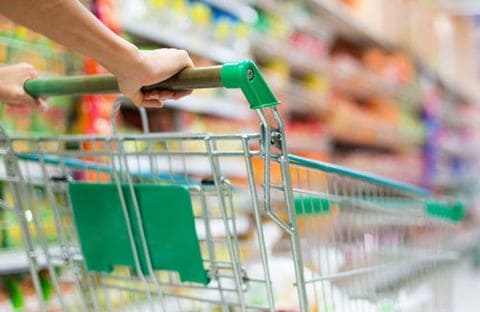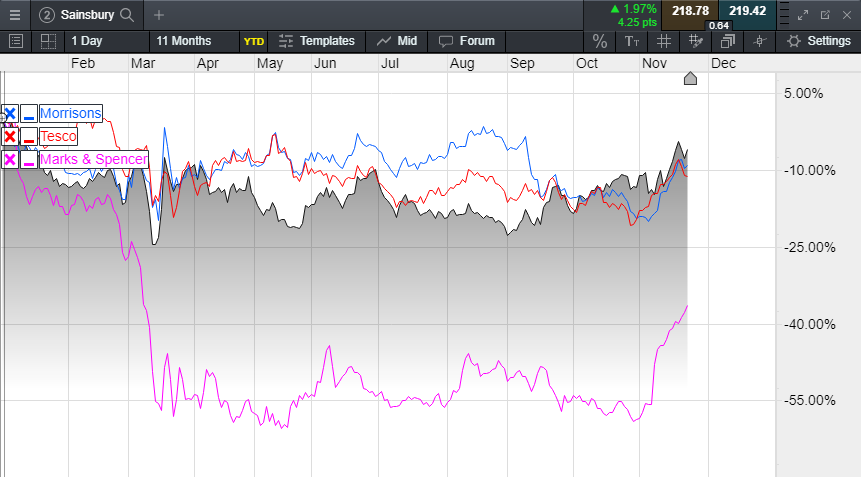
The food retail sector has been in a state of flux in recent years, with the established big four UK supermarkets having to share their market with the new kids on the block of Aldi and Lidl, who have seen their combined market share grow to challenge the likes of Sainsbury’s and Asda, while jumping ahead of the more established players Co-op and Waitrose.
In 2019, only Tesco’s share price performance managed to come out ahead in what was a tough year for Sainsbury’s, who missed out on completing a tie-up with Asda due to a ruling from the Competition and Markets Authority, on the grounds that it would increase prices and decrease competition.
The last 12 months hasn’t been much better for Sainsbury’s share price, which is rather surprising when you consider supermarkets have managed to remain open all year, despite other retailers having to remain closed as the pandemic blazed a fire of destruction across the economy.
Sainsbury’s share price performance chart (2020)

Sainsbury’s not only managed to be the worst performer in 2019, it has also struggled to take advantage this year as well, though to be fair it hasn’t been alone in striving to meet the logistical challenges of Covid-19.
Sainsbury’s share price hits record low
Even Tesco, which had a great 2019, has seen its share price struggle, however at least Tesco’s share price didn’t hit record low levels earlier this year in the way that Sainsbury’s share price did in March.
While it’s understandable that Sainsbury’s should feel aggrieved by the regulator’s actions last year, management finally appear to have realised that they need to move on. This year new CEO, Simon Roberts, appears to have grasped the nettle of cutting some of the extraneous costs that it took over when it acquired Argos. It also finally appears to have realised that it needs to get rid of Sainsbury’s Bank, having stopped conducting new business earlier this year. This is something they should looked to have done when Tesco offloaded its own mortgage book to Lloyds for £3.7bn in 2019. Better late than never I suppose.
M&S must revamp store footprint
Marks & Spencer has been by far the worst performer, though in its defence it has a much greater exposure to general merchandise and the home market, which took the greatest hit to its business. It also means that it can’t really be considered a food retailer in the true sense of the word, even though its food offering has probably saved it from even greater share price weakness.
M&S has also been undergoing another attempt to turn around its failing general merchandise business model, and has in the process realised that the big store retail footprint has become an outdated business model. M&S owns a lot of big stores and this sort of store footprint has become increasingly outdated, as retailers like Debenhams have found out to their cost.
Tesco maintains market share as Sainsbury’s, Asda decline
In terms of market share, according to Kantar Worldpanel, Tesco still remains the market leader at 27%, followed by Sainsbury’s and Asda at 15.3% and 14.4% respectively, while Morrisons comes in fourth at 10.2%. While Tesco has remained steady, in terms of market share, it’s noticeable that both Sainsbury’s and Asda are lower than a year ago, while Morrisons has consolidated its fourth position. Aldi has remained in fifth place, but lost ground a little, to 7.8% from 8%. Lidl has improved from 5.9% to 6.1%, as both budget retailers look at ramping up their store opening programmes.
In terms of overall sales, all supermarkets have seen their sales increase this year, with frozen food in particular being a significant outperformer, with Iceland especially reaping a benefit, even though it only accounts for 2.3% of the UK grocery market.
Morrisons has been one of the bigger winners in the last three months, with sales growing by 11.4%, while Tesco’s climbed 9.1%, Sainsbury’s sales rose 7.6% and Asda’s increased 5%. Unsurprisingly, Ocado recorded the biggest sales growth with a rise of 36.1%, however its overall sales only account for 1.7% of the UK grocery market.
Focus on costs helps Tesco remain No.1
Tesco, the UK’s number one supermarket, has been able to consolidate its reputation as the UK’s biggest supermarket by a continued focus on costs, as well as scale. This year it announced the disposal of its Thai and Malaysia businesses for $10.8bn, with £5bn of that set to be paid out to shareholders by way of a special dividend. The company also announced the sale of its Polish business for £165m, a deal which is due to complete early next year.
The sector initially benefitted from the elimination of business rates as part of the government’s attempt to help out the retail sector, though this has become less of a factor, after Tesco handed back its rates relief in the face of mounting political pressure. The short term benefit of this measure paled into insignificance in the longer term by an estimated annual £1bn increase in costs as a result of measures to improve staff safety as well as creating 16,000 new roles in August to keep up with increased demand.
Its first-half update earlier this year shone a light on how the pandemic has affected the business, with a 6.6% rise in sales to £26.7bn, while operating profits slipped by 4.5%. There were some weak spots, namely in the Booker operation, as catering sales dropped 12% as restaurants, cinemas and bars were closed down, but overall, the sheer scale and diversity of the Tesco business, now under the stewardship of new CEO Ken Murphy, has meant that the business is likely to remain out in front as the UK’s number one supermarket. Even the rise of the likes of Aldi and Lidl haven’t been enough to eat into its position as the market leader.
The Aldi price match scheme which launched in March appears to have been enough to arrest the rise of the young bucks of the supermarket sector, at least as far as Tesco is concerned anyway. Tesco’s food sales in the first half rose 9.2%, while sales of clothing fell by 17.2%.
Sainbury’s pays out dividend as Argos stores close
Sainsbury’s share price has had a disappointing year, though it does appear to be on an upward track, after the record lows of March. Its first-half report was somewhat of a mixed bag. Revenues came in at £16.56bn, with total sales rising 7.1%, helped by a 117% rise in digital sales to £5.8bn, which accounted for 40% of total sales. Fuel sales were a bit of a drag, primarily down to the lockdown in April.
Sales at Argos also had a significant boost in the first half as more people shopped online, however costs increased by £290m due to Covid-19, though that was mostly offset by £230m in business rates relief. Operating profits also came in better than expected, however a one-off £438m charge in respect of Argos store closures resulted in the company posting a loss of £137m. It’s welcome that management are belatedly looking to trim down the Argos real estate, while subsuming them inside its existing supermarket floor space.
The decision to pay a special dividend, along with an interim payment, while likely to be welcomed by shareholders, does come across as a bit tone deaf when also announcing the possible loss of 3,500 jobs, due to the permanent closure of up to 148 standalone Argos stores, though some of these stores may well reopen inside existing supermarkets. It’s also remarkably daft given the various tax rates reliefs that have been afforded to the sector, due to the pandemic, giving its critics an open goal to shoot at. This forced Sainsbury’s to follow Tesco in paying back its rates relief soon after.
The move was even more jarring when Sainsbury’s nearest competitor, Tesco is adding staff and suggests that new CEO Simon Roberts hasn’t learnt from the mistakes of his predecessor Mike Coupe, who wasn’t immune to the odd misstep or two.
It’s also welcome news that management appear to be finally looking to offload Sainsbury’s Bank, an area of the business that currently adds nothing to the overall business, and lopped £55m off underlying operating profits in the first half.
Morrisons share price underperforms as profit falls 25%
Morrisons’ share price has also underperformed this year. Like its peers, it has also gone down the diversification route, signing a deal with convenience store chain McColl’s three years ago, in addition to the tie-up with Amazon, which means anyone ordering on Prime Now will find Morrisons staff picking and delivering groceries in selected areas for same-day delivery.
The slow rollout of this service could be behind the underperformance of the Morrisons share price, given it’s only available in about 50 supermarket locations. Given the way this year has panned out, this can only be construed as an enormous missed opportunity for Morrisons.
In terms of the wider business, first-half like-for-like sales rose 8.7%, however total revenues declined 1.1% due to lower demand for fuel during the April lockdown. Profits were also lower, down 25%, due to Covid-19-related net costs of £62m.
On the plus side, home delivery capacity has expanded and will continue to do so with the help of Morrisons on Amazon, as well as Deliveroo, who signed a deal with Morrisons to deliver from up to 130 stores from 8 April this year.
Ocado share price gains as revenue grows
Continuing to confound its critics, the Ocado share price has made more gains this year, with the jury still out as whether it can be viewed as a retailer, or a technology provider.
Last year the company penned a £750m deal with Marks & Spencer to deliver an initial range of 4,400 food products, along with 700 from the M&S lifestyle range from the beginning of September.
We saw the benefit of this deal in its most recent Q3 numbers. Retail revenue grew 52% in the quarter, rising to £587.3m, with the average spend coming in at £141 and average orders per week rising to 345,000 from 315,000, from the same period a year ago. Management also said they expected full-yearEBITDA to come in well above its previous guidance of £40m, at £60m.
The company also said it was acquiring Kindred Systems and Haddington Dynamics, two companies that specialise in robotics manufacture for a combined $287m, as it looks to streamline the picking functions in its automated fulfilment centres, in order to improve efficiencies.
With a market cap now up at an eye-wateringly high £16bn, Ocado is bigger than Sainsbury’s and Morrison combined, and second only to Tesco in terms of size. It therefore needs to continue to grow if only to justify a valuation that bears little relation to the underlying fundamentals, with revenues still less than £2bn on an annualised basis.
Challenging year in food retail
It’s been an extremely challenging 12 months for UK food retail, a challenge that they have, by and large, met head on, and for which they deserve a lot of credit for. There have been some who have criticised the business rates relief afforded to a sector that was allowed to continue trading, even as everything else was forced to close.
While in some respects this criticism may feel justified, it really isn’t when you consider the costs involved in not only protecting existing staff, but also ramping up capacity for online and logistical operations to ensure that the shelves remained stocked after the initial shock of lockdown prompted shortages in some products.
£1bn investment set to boost Asda in 2021
As we look ahead to 2021, competition is likely to remain fierce with Asda likely to be much tougher competition now that it is in the hands of the EG Group and TDR Capital. The Walmart years of drift are likely to be replaced with a much great focus on strengthening the business, its supply chains and boosting its online operation. The new owners have pledged to invest over £1bn in the next three years to accomplish this.
Sainsbury’s is likely to have its work cut out in maintaining its place as the UK’s number two supermarket.
Disclaimer: CMC Markets is an execution-only service provider. The material (whether or not it states any opinions) is for general information purposes only, and does not take into account your personal circumstances or objectives. Nothing in this material is (or should be considered to be) financial, investment or other advice on which reliance should be placed. No opinion given in the material constitutes a recommendation by CMC Markets or the author that any particular investment, security, transaction or investment strategy is suitable for any specific person. The material has not been prepared in accordance with legal requirements designed to promote the independence of investment research. Although we are not specifically prevented from dealing before providing this material, we do not seek to take advantage of the material prior to its dissemination.





















